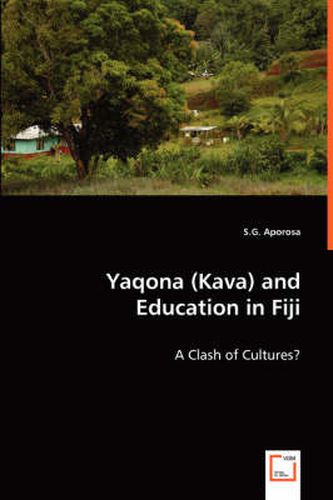Readings Newsletter
Become a Readings Member to make your shopping experience even easier.
Sign in or sign up for free!
You’re not far away from qualifying for FREE standard shipping within Australia
You’ve qualified for FREE standard shipping within Australia
The cart is loading…






This title is printed to order. This book may have been self-published. If so, we cannot guarantee the quality of the content. In the main most books will have gone through the editing process however some may not. We therefore suggest that you be aware of this before ordering this book. If in doubt check either the author or publisher’s details as we are unable to accept any returns unless they are faulty. Please contact us if you have any questions.
In the Fiji Islands, education is promoted as a pathway to development. However, low academic achievement is undermining this strategic focus, with some observers questioning the influence of culture and values on scholastic failure. This book examines the ‘culture of yaqona’ (the etiquette associated with the use and consumption of the beverage kava) and the impact this substance is having on education delivery and under-achievement in rural Fiji.Factors that comprise the ‘culture of yaqona’ are examined, including cultural observance and the vakaturaga (chiefly) ethos, networks of obligation, tauvu and veitabani relational connections, bole (a non-aggressive form of competitive consumption), ideals of masculinity and the ‘grog swiper’, kanikani (dry skin from excessive consumption) as a ‘badge of honour’, and strategic forms of consumption that allow attendees to stay until drinking sessions’ completion. Teachers’ consumption habits and the effects of kava on the body and productivity are also discussed. This study, the first of its kind, reveals that one third of rural teachers consume yaqona for an average of six hours on nights prior to teaching in the classroom, and that this negatively affects education delivery and student academic achievement. However, it is argued that due to complicating factors this traditional beverage should not be banned from the teaching environment.
$9.00 standard shipping within Australia
FREE standard shipping within Australia for orders over $100.00
Express & International shipping calculated at checkout
This title is printed to order. This book may have been self-published. If so, we cannot guarantee the quality of the content. In the main most books will have gone through the editing process however some may not. We therefore suggest that you be aware of this before ordering this book. If in doubt check either the author or publisher’s details as we are unable to accept any returns unless they are faulty. Please contact us if you have any questions.
In the Fiji Islands, education is promoted as a pathway to development. However, low academic achievement is undermining this strategic focus, with some observers questioning the influence of culture and values on scholastic failure. This book examines the ‘culture of yaqona’ (the etiquette associated with the use and consumption of the beverage kava) and the impact this substance is having on education delivery and under-achievement in rural Fiji.Factors that comprise the ‘culture of yaqona’ are examined, including cultural observance and the vakaturaga (chiefly) ethos, networks of obligation, tauvu and veitabani relational connections, bole (a non-aggressive form of competitive consumption), ideals of masculinity and the ‘grog swiper’, kanikani (dry skin from excessive consumption) as a ‘badge of honour’, and strategic forms of consumption that allow attendees to stay until drinking sessions’ completion. Teachers’ consumption habits and the effects of kava on the body and productivity are also discussed. This study, the first of its kind, reveals that one third of rural teachers consume yaqona for an average of six hours on nights prior to teaching in the classroom, and that this negatively affects education delivery and student academic achievement. However, it is argued that due to complicating factors this traditional beverage should not be banned from the teaching environment.